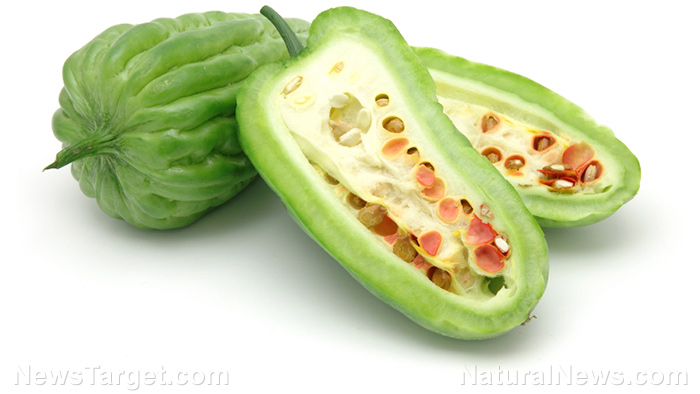Researchers identify compound in bitter melon that can lower blood sugar effectively
02/01/2021 / By Evangelyn Rodriguez

Momordica charantia, or bitter melon, is a tropical vine whose fruit is commonly used in Asian cuisine. Despite its strong, bitter taste, many people still choose to eat this unusual vegetable because of its many health benefits. One of the best-known properties of bitter melon is its ability to lower blood sugar levels. This has been demonstrated in numerous studies and has led to bitter melon extracts being used as dietary supplements, especially by diabetics.
In a recent study, researchers from France and Congo investigated the active components of bitter melon grown in Congo and evaluated the antidiabetic properties of its ethanol extract. Their aim is to confirm the presence of a compound called charantine, which has been identified as the main anti-diabetic component of bitter melon. The researchers reported their findings in an article published in the Journal of Medicinal Plants Research.
Locally grown bitter melon in Congo contains anti-diabetic charantine
Bitter melon belongs to the gourd (Cucurbitaceae) family and is closely related to common garden fruits like cucumber, pumpkin, squash and zucchini. It is widely grown in tropical regions in Africa and is also used as a vegetable as well as a natural medicine. In Congo, bitter melon is known as a traditional treatment for diabetes and is also used a remedy for various ailments, such as constipation, malaria and parasitic worm infections.
However, despite the widespread use of locally grown bitter melon as folk medicine, no studies have been done to analyze its chemical and biological properties. To address this, the researchers decided to conduct several experiments using ethanol extracts derived from the leaves of bitter melon. According to literature, bitter melons from China and India are rich in bioactive components, such as alkaloids, cardiac glycosides, flavonoids, plant steroids, saponins and tannins.
Phytochemical studies of bitter melon extracts eventually led to the identification of various compounds, such as momordicosides, momordenol, momordicin, cucurbitacin and charantine. Among these, charantine is the only compound that has been reported to exert anti-diabetic effects. Charantine can be isolated from the seeds, fruits and leaves of the bitter melon plant.
For their experiment, the researchers analyzed the ethanol extract of locally grown bitter melon using gas chromatography and mass spectrometry. They confirmed the presence of charantine in the extract. To test its anti-diabetic activities, the researchers treated rats with streptozotocin-induced diabetes with the bitter melon extract. They reported that the extract reduced blood sugar levels in the diabetic mice by 51.62 percent after three hours.
Based on these findings, the researchers concluded that the presence of anti-diabetic charantine in bitter melon growing in Congo justifies its use in Traditional Congolese Medicine. (Related: Eating bitter melon is a great way to keep diabetes at bay.)
Other health benefits of bitter melon
Different varieties of bitter melon exist around the world. Despite some differences in appearance, these vegetables all offer the same health benefits. For instance, all of them are excellent sources of vitamins A and C. They also contain minerals like iron, potassium and zinc, and powerful antioxidants like catechin, gallic acid, epicatechin and chlorogenic acid. In addition, bitter melon is a good source of fiber, which helps improve digestion and promotes satiety.
Here are the other remarkable things bitter melon can do:
- Improves blood sugar control
- Contains cancer-fighting compounds
- Helps decrease blood cholesterol levels
- Reduces belly fat and promotes weight loss
Bitter melon, be it in its original form or in supplement form, is a great addition to a healthy, anti-diabetic diet. If you’re a diabetic who wishes to use bitter melon supplements for diabetes management, consult with a natural health practitioner to find out the best dosage for you.
Sources include:
Submit a correction >>
Tagged Under:
alternative medicine, antidiabetic, bitter melon, charantine, diabetes cure, disease treatment, food cures, food is medicine, functional food, natural cures, natural medicine, phytonutrient, research, supplements, veggie
This article may contain statements that reflect the opinion of the author
RECENT NEWS & ARTICLES
FoodIsMedicine.com is a fact-based public education website published by Food Is Medicine Features, LLC.
All content copyright © 2018 by Food Is Medicine Features, LLC.
Contact Us with Tips or Corrections
All trademarks, registered trademarks and servicemarks mentioned on this site are the property of their respective owners.





















